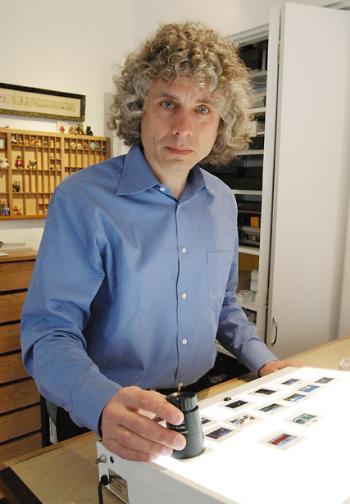
News
Summers Will Not Finish Semester of Teaching as Harvard Investigates Epstein Ties

News
Harvard College Students Report Favoring Divestment from Israel in HUA Survey

News
‘He Should Resign’: Harvard Undergrads Take Hard Line Against Summers Over Epstein Scandal

News
Harvard To Launch New Investigation Into Epstein’s Ties to Summers, Other University Affiliates

News
Harvard Students To Vote on Divestment From Israel in Inaugural HUA Election Survey
Art Meets Academics in Professorial Avocations
Professors of varying fields share an interest in extracurricular pursuits

The arts are flourishing at Harvard; and not where one might readily think. Far from the departments of music and Visual and Environmental Sciences, another artistic culture is thriving-—in the fields of psychology, government, and mathematics. Professors Steven Pinker, Andrea L. Campbell, Noam D. Elkies, Benedict H. Gross, and John D. Boller have breached the boundaries of their respective fields to dabble in music and the fine and dramatic arts.
Following through with life-long artistic interests, these professors participate in the artistic world as either a divergence from their professional lives or to integrate their art with their work at Harvard and their personal research.
Johnstone Family Professor of Psychology Steven Pinker’s interest in photography is one example of the ways in which art and the sciences have become interconnected by these professors. Professor Pinker, an avid photographer, has taken pictures of diverse locations ranging from Cambridge, Mass. to New Zealand. Once in graduate school, Professor Pinker noted the links between his psychological research and the art of photography. He says, “One reason that it meshes with my interests in psychology, in particular, [is] visual perception—how do we see a 3-D scene from a 2-D image?—and evolutionary aesthetics-—what are the properties of scenes, faces, and objects that most appeal to people?” Professor Pinker’s photographs have graced the covers of the Journal of Cognitive Neuroscience and pamphlets for conferences, though they have also been solicited for wedding invitations and tourist guides. He maintains a webpage on the Psychology Department’s site with information about his research as well as several photographic albums.
Assistant Professor of Government Andrea Campbell ’88 demonstrates the power of music to bring people together. When sitting in the clarinet section of the Harvard Wind Ensemble as an undergraduate, Professor Campbell had no idea that she would sit next to her future husband Alan Feinstein ’86. Today, Professor Campbell is the faculty advisor for the Harvard Pops Orchestra and her husband is the group’s conductor. Having played both the clarinet and piano since the age of 10, Professor Campbell dedicates most of her current musical time to the clarinet as a member of the Cambridge Symphony Orchestra and favors the short piano works of Brahms as well as any piece with “a good clarinet solo.”
Mathematics professor Noam D. Elkies has been playing and composing music for the piano since the age of three. His mother, a piano teacher, introduced him to music at a young age. He says, “I started playing at three and putting notes on paper shortly after.” Professor Elkies attributes his early interest in music to mathematics, citing the numbers listed above the notes in a beginner’s music book (the numbers indicate which fingers to use). He composed his first piece at the age of six and still plays it to this day. In graduate school at Harvard, Professor Elkies was first accompanied by the Harvard Glee Club. He commenced a long-time affiliation with Lowell House when his first opera was played as the Lowell House Opera in 1985. Professor Elkies describes the suggested link between music and mathematics as “fascinating” but he notes that he is “better at either math or music than philosophizing about the relationship between them.”
Leverett Professor of Mathematics and Dean of Harvard College Benedict H. Gross ’71 has maintained his musical interests from the third grade, when he first picked up the viola, to his undergraduate years at Harvard, to the present day, as a member of a quartet of mathematicians. His current repertoire includes “the classical quartet literature, up to Dvorak and Ravel.” Having played in the Harvard-Radcliffe Orchestra while studying at Harvard, Dean Gross still attends alumni sight readings. He humbly added, “They put me next to someone competent so I can keep up. This fall I got to play viola in the Band’s 85th anniversary concert—it was a joke piece.”
Professor John D. Boller of the Mathematics Department is a current member of the Wellesley Summer Theater Company and likes to perform in one or two shows per year at the end of each school semester. Professor Boller has been involved in dramatic acting since childhood, participating in school plays in high school, college, and graduate school. His most recent performance, in June 2004, was in Paulie Peale’s stage adaptation of Jane Eyre by Charlotte Brontë. Though Professor Boller has never participated in a theatrical production while at Harvard, his students requested that he perform for them after the semester’s curriculum had been completed. The result was the recitation of a monologue from Shakespeare’s Macbeth during a recent reading period.
At Harvard College, it can never be said that the arts and sciences are isolated fields. These five professors are proof in our own back-“yard” that the arts are alive and well in all areas of Harvard, from the Fogg Museum to the music building to the science center.
Want to keep up with breaking news? Subscribe to our email newsletter.
